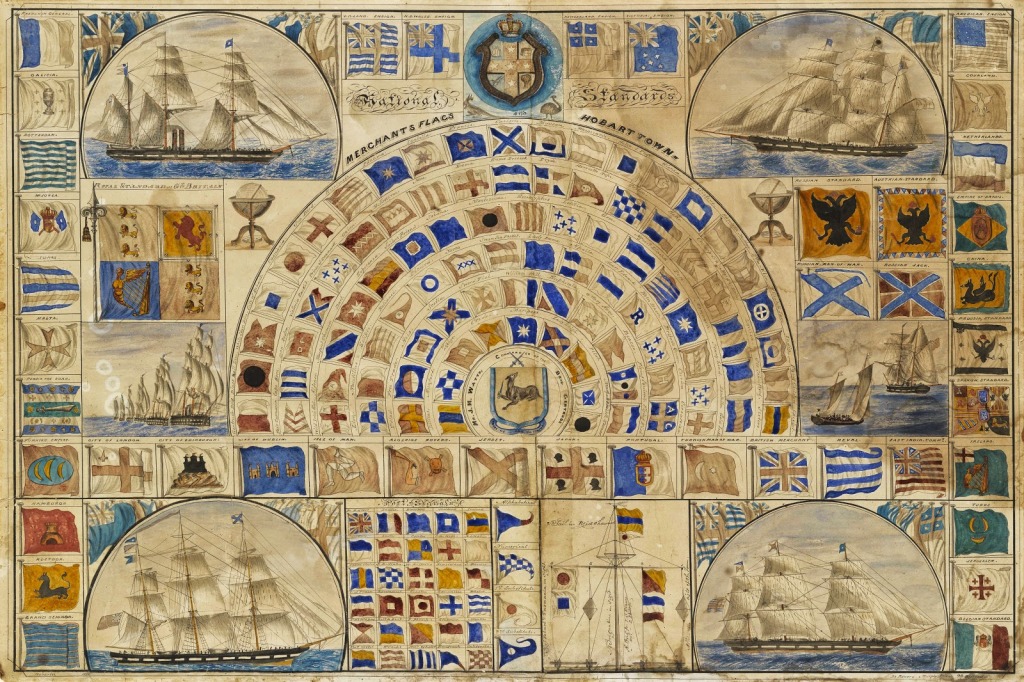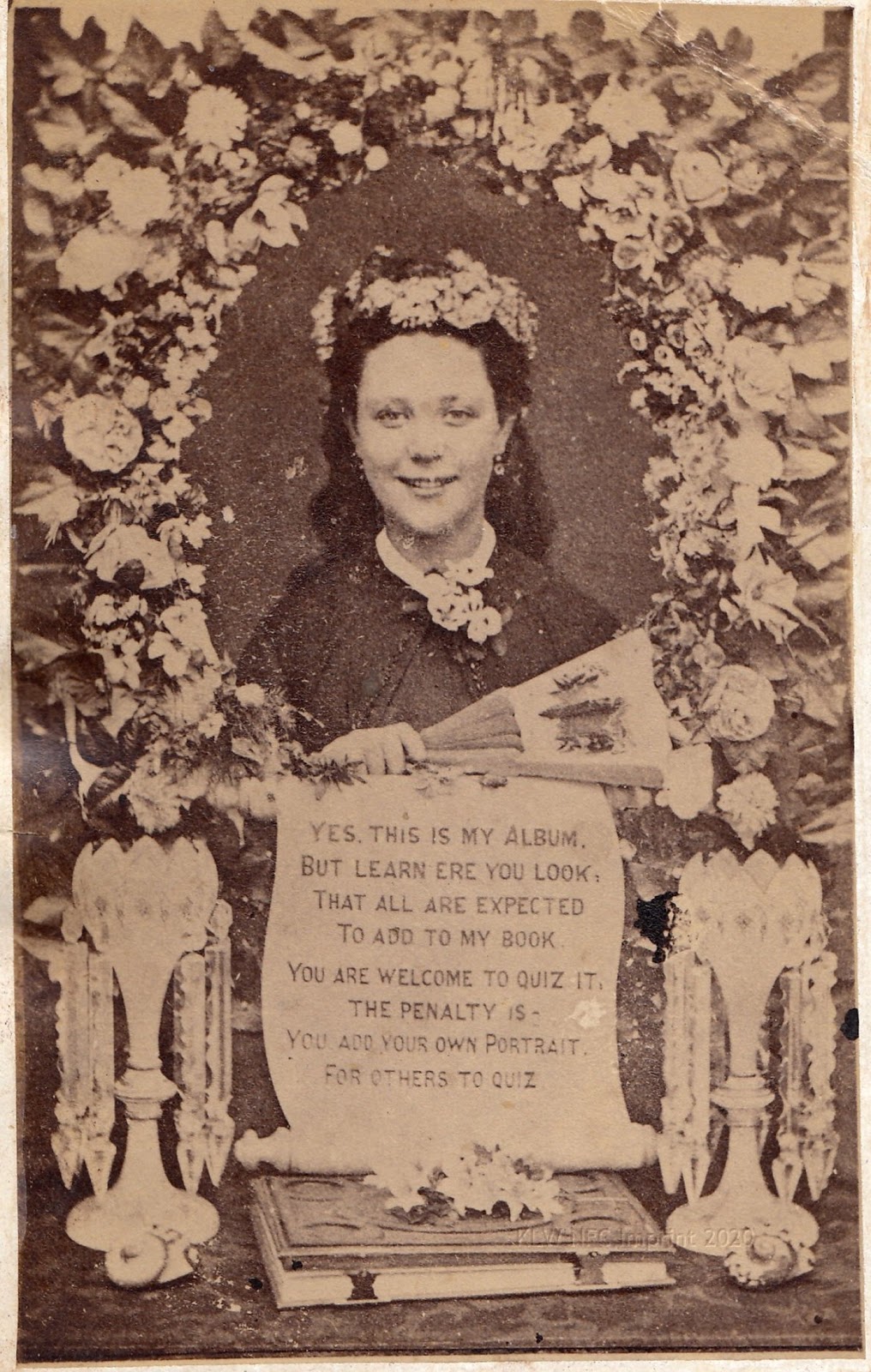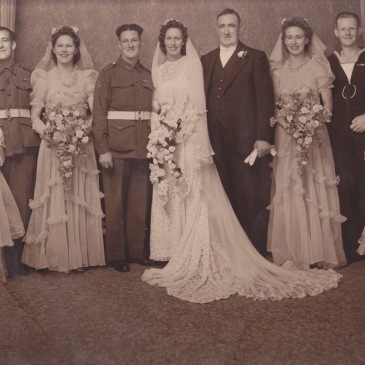A brief summary of generational levels of the immediate families of Tasmanian photographer Thomas J. NEVIN and his wife Elizabeth Rachel Nevin nee DAY, 1830s-1920s.
(a) GENERATION ONE: Dickson, Nevin, Day, Pocock and Goldsmith
Mary Ann Nevin nee Dickson (1810-1875) and John Nevin snr (1808-1887) had four children, all born near Belfast, Ireland between 1842 and 1852, prior to arrival as free settlers at Hobart, Van Diemen’s Land (Tasmania) in July 1852. Born in England, Mary Ann Dickson was the sister of rose grower Alexander Dickson, established at Newtonards, Ireland. John Nevin snr was a former soldier (Royal Scots First Regiment), a journalist, poet and gardener.
Children of Mary Ann Nevin nee Dickson and John Nevin snr
1. Thomas James (Thos) Nevin (1842-1923) m. Elizabeth Rachel Day (1847-1914)
2. Mary Ann Nevin (1844-1878) m. John Carr
3. Rebecca Jane Nevin (1847-1865)
4. William John (Jack) Nevin (1852-1891)
Children of Rachel Day nee Pocock (ca. 1812-1857) and Captain James Day (1806-1882). Rachel Day nee Pocock died of “consumption” at Hobart in 1857, and Captain James Day died in 1882 at the home of his younger daughter Mary Sophia Axup, Battery Point, Hobart. Photographer Thomas James Nevin married Elizabeth Rachel Day on 11th July, 1871 at Kangaroo Valley, Hobart.
1.Elizabeth Rachel (Lizza) Day (1847-1914) m. Thomas J. Nevin (1842-1923)
2. Mary Sophia Day (1853-1942) m. Hector Charles James Horatio Axup (1843-1927)
Children of Elizabeth Goldsmith nee Day (1802-1875), sister of Captain James Day, and Captain Edward Goldsmith (1804-1869). These were the Goldsmith cousins of the Day sisters, Elizabeth Rachel Day and Mary Sophia Day. Richard died in Hobart, 24 yrs old, in 1854 and Edward jnr died in Rochester (UK) in 1883.
1. Richard Sydney Goldsmith (1830-1854)
2. Edward Goldsmith jnr (1836-1883) m. Sarah Jane Rivers (1835-1926)
(a.1) GENERATION ONE extended: John Nevin’s second marriage: Genge and Chandler families
Mary Ann Nevin nee Dickson (1810-1875), first wife of John Nevin snr (1808-1887) died in 1875. He married his second wife, widow Martha Genge (1833-1925) (formerly Salter), in 1879. There were no children born to Martha Genge and John Nevin, although they acted as step-grandparents to Minnie Carr (1878-1898) daughter of John Nevin’s daughter Mary Ann Carr nee Nevin (1844-1878) who died in Victoria within weeks of giving birth.
Mary Chandler nee Genge (1835-1923), sister of Martha Nevin nee Genge was the second wife of shoe maker William Chandler. Of the three children born in this marriage, the youngest, James Chandler (1877-1945), who would become a professional photographer, was Thomas J. Nevin’s successor to the vocation of photography within the extended family network
(b) GENERATION TWO: Day, Nevin, and Axup
Mary Sophia Axup nee Day (1853-1942) and Hector Charles James Horatio Axup (1843-1927) had five children between 1878 and 1891.
Children of Mary Sophia Axup nee Day and Hector C. Axup
NB: These dates may not be totally accurate.
1. Rachel Frances Eva Axup (1878-1978) m. P. Baldwin
2. Sidney James Vernon Axup (1882-1975) m. Emily Tyson
3. Edward Harold Leslie Axup (1885-1964) m.
4. Patience Ella Mary Axup (1889-1913)
5. Olive Lilian Ethel Axup (1891- ? ) m. Wilshire
Elizabeth Rachel Nevin nee Day (1847-1914) and Thomas James Nevin (1842-1923) had seven children, six surviving to adulthood. Three sons – Sydney, William and George – were born at the Hobart Town Hall during their father’s residency as Office and Hall Keeper. Sydney died four months after birth.
Children of Elizabeth Rachel Nevin nee Day and Thomas J. Nevin:
1. Mary Florence Elizabeth (May) Nevin (1872-1955)
2. Thomas James (Sonny) Nevin (1874-1948) m. Gertrude Tennyson Bates (1883-1958)
3. Sydney John Nevin (1876-1877)
4. William John Nevin (1878-1927)
5. George Ernest Nevin (1880-1957)
6. Mary Ann (Minnie) Nevin (1884-1974) m. James Henry Alfred Drew (1878-1963)
7. Albert Edward Nevin (1888-1955) m. Emily Maud Davis (1891-1971)
Fifty most recent posts about women from March 2024
- Confusion for the press, 1879: was she/he/they a female or a male “impersonator”?
- Christmas from our Archives
- First Mate James DAY on the “Panama” to California 1850-1851
- Prisoner Charles J. GARFORTH said he would make Superintendent Adolarious H. BOYD pay dearly, 1875
- Mrs Elizabeth Goldsmith and the saltmarsh known as Lady’s Tippett, 1870
- Preview of new research 2023
- Lost originals: the Nevin, Genge and Chandler family photographs
- NEVIN & SMITH, 1868: the client with white fingernails
- Captains, emigrants and convicts: the summer of 1842-3 in Hobart, VDL
- Best of friends: Emma PITT and Liz O’MEAGHER 1866
- Lost and found: one day in 1866 and the scientific racism which followed
- Captain Goldsmith’s “private friend” Edward Macdowell 1840s
- George and Matilda Cherry at Thomas Nevin’s studio ca. 1872
- Reproductions of Charles A. Woolley’s portrait of Tasmanian Aborigines 1860s-1915
- Captain Hector Axup and the French lady of Green Island, 1888
- The case against Henry Stock (var. Stocks) 1884 for the murder of his wife and her child
- Prisoner Joseph WALMSLEY: “a queer-looking man” 1842-1891
- Thomas J. Nevin at his finest: Camille Del Sarte and family 1860s-1870s
- Alfred Bock and the Bayles sisters
- Elizabeth Allport nee Ritchie at Thomas J. Nevin’s studio 1876
- Alfred Hope and his landau with Albert Nevin early 1900s
- Elizabeth Rachel Day’s album opener 1860s
- Sarah Crouch at Thomas J. Nevin’s studio ca. 1872
- Youngest daughter Minnie Nevin m. James Drew (1884-1974)
- Rosanna Mary Domeney nee Tilley at Thomas Nevin’s studio 1870s
- Thomas Nevin and Alfred Barrett Biggs 1872-1876
- Exhibition 2019: T. J. NEVIN’s mugshot of prisoner James BLANCHFIELD 1875
- Prisoner John NOWLAN alias DOWLING 1870-1876
- Prisoner William SAWYER or SAYER(s) 1875
- Joseph Somes, Captain Edward Goldsmith and the “Angelina” 1844-46
- A distinguished forelock: Henry Dresser Atkinson on board the “City of Hobart” 1872
- Captain Goldsmith, AWOL seaman Geeves, and HMS Havannah
- Captain Edward Goldsmith and wife Elizabeth’s land deals in VDL
- Thomas Nevin’s photographs mounted on calico 1870s
- Thomas Nevin at the Canary and Cage Bird Show 1869
- Bleak Expectations: Captain Goldsmith’s will in Chancery 1871-1922
- 1854: a year onshore at Hobart Tasmania for Captain Edward Goldsmith
- John Nevin snr and family 1851-1854: shipping documents
- Captain Edward Goldsmith and the conundrums of the Ethiopian Serenaders 1851
- The Will of Richard Goldsmith snr (1769-1839)
- Treasures passed down from Captain Edward Goldsmith and Captain James Day
- Thomas Nevin and the Terpsichoreans, New Norfolk 1867
- Portraits and landscapes from T. J. Nevin’s cohort
- Amy Bock’s bid for marriage equality in 1909 in New Zealand
- One session, two poses
- Recent Hobart Publications 2016 and Thomas J. Nevin 1870s
- Convict photographs by T. J. Nevin at the Art Gallery NSW Centenary Exhibition 1976
- Serious money: Captain Edward Goldsmith and shipowner Robert Brooks
- Captain Goldsmith, James Lucas and Peter Fraser: 500 acre leases 1853
- Marriage breakdown: Elizabeth Amos v Alfred Threlkeld Mayson 1879-1882
























You must be logged in to post a comment.